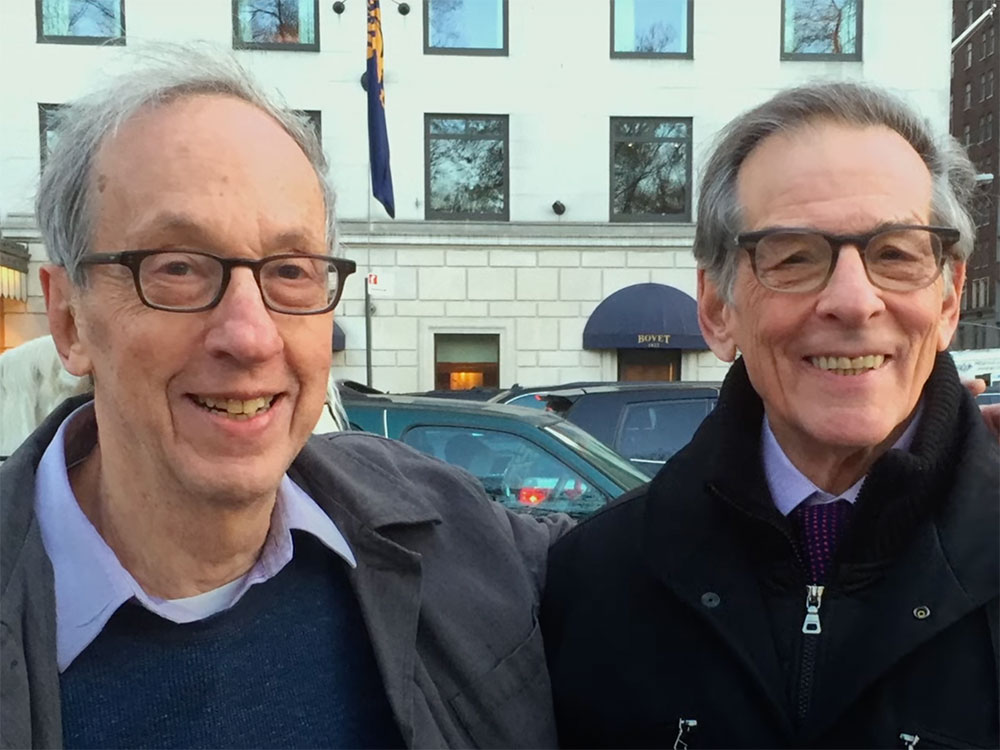The sheer relief of spending 112 minutes with the subjects of the new documentary Turn Every Page: The Adventures of Robert Caro and Robert Gottlieb came as something of a pleasant shock. I have a degree of familiarity with both men, but I was unprepared for how deeply fascinating and charming they both are, as well as the many profound implications their work has on current events.
Robert Caro and Robert Gottlieb have been at the forefront of American literature and journalism for close to 70 years. Caro is a Pulitzer Prize-winning author and journalist. Gottlieb was the editor-in-chief of the publishing house Simon & Schuster, editor ex-officio at publisher Alfred A. Knopf and editor of the The New Yorker. Both are now in their final act (Caro is 86 and Gottlieb 91), but still working in their respective fields.
But the real subject of the film isn’t so much the curious relationship between writers and editors, although that’s more than enough for a couple of films. The heart of the movie centres on the joy of intelligence itself.
After so much blazingly painful foolishness coming out the U.S. of late, the film is a piercing reminder that good humour, hard work and a dedication to the greater good — be it a pain-staking depiction of American history or a well-placed semi-colon — are also part of the country and its people. Maybe this is why it filled me with a fizzy elation. So much so that I immediately told everyone I knew to go and see the film.
On the surface, Lizzie Gottlieb’s documentary is about the working relationship of these two men, one of whom is her famous father, Robert Gottlieb. But of course, the film encompasses a lot more than that. The younger Gottlieb interweaves the two men’s life stories with the larger cultural shifts taking place. Both emerged from a specific period in American history, coming of age when seismic change was afoot.
Born in 1935, Caro grew up Central Park West in New York City, attended the Horace Mann School, studied at Princeton and started his career as a journalist at Newsday, then a small paper on Long Island.
The title of the film is derived from a piece of advice that Caro received from Newsday managing editor Alan Hathway, his then-boss. Caro was hired as a joke on Hathway, who had a particular loathing for college-educated youngsters. But the reporter proved his mettle researching stories. When he was invited into Hathway’s office and informed that he was being assigned to do investigative work, Caro explained that he didn’t actually know how to do that. Hathway fixed him with a long stare and finally said, “Turn every page. Never assume anything. Turn every goddamn page.”
While working on a story about a proposed bridge project for Newsday, Caro decided that the titanic figure and infamous New York City urban planner and public official Robert Moses would make an interesting subject for a book.
Caro’s series on the bridge project had attracted the attention of New York then-governor Nelson Rockefeller. Despite inherent problems, it was still put forth due to Moses’s extraordinary power and influence. It was this degree of iron control from a man who had never been elected to any public office that attracted Caro. He quit his job as a reporter and started work on the book.
Caro’s long-time agent Lynn Nesbit offered to represent him after reading an early draft of what was to become The Power Broker. She set up a series of meetings with preeminent editors of the day, one of whom was Gottlieb. Unlike the other editors who promised stardom and a fancy lunch, Gottlieb offered sandwiches in his office and solid advice on how to make the book better. Caro chose Gottlieb to be his editor. Thus began a decades-long professional partnership that defined both men’s careers.
Behind ‘The Power Broker,’ and the importance of Ina
Caro began working on Moses’s biography thinking it would take little more than nine months. But the project soon spiralled into unparalleled territory, ballooning to 1,336 pages. The first draft of The Power Broker was a towering stack of paper. In order to fit it into one physical volume, some 350,000 words needed to be cut, whittling the book down from a million words to 700,000. The editing process took close to a year. Even then, the sheer size strained what a book’s spine could actually hold.
The Power Broker: Robert Moses and the Fall of New York would take more than seven years to complete. The book was a meteoric triumph, racing to the top of the bestsellers list and vaulting Caro to the top tier of American writers. He has won almost every significant literary award in addition to two Pulitzer Prizes. The Power Broker remains in print and is currently in its 41st edition.
One of the unsung heroes of his story is Caro’s wife Ina, who supported her husband throughout his career. In order to complete The Power Broker, the couple sold their house on Long Island and moved into a crappy apartment. Ina, a writer and researcher in her own right, took a job teaching, but also contributed immensely to Caro’s work.
Every book he has written is dedicated to her.
On presidents and men
Following the publication of The Power Broker, Caro turned his attention to a planned trilogy on Lyndon B. Johnson. The first number of volumes covered the U.S. president’s childhood, his emerging political career as well as his time in the senate.
In order to fully understand the nature of his subject, Caro and Ina moved to the Texas hill country where Johnson grew up in order to immerse themselves in the culture and history of the place. It was here that some of the most revelatory aspects of the former president’s life and career were revealed. The story of the Box 13 voting scandal is perhaps the most shocking.
In the process of researching Johnson’s early career, the stolen election in the 1948 Texas senate race came up. Caro tracked down Luis Salas, a former Texas voting official. He was living in a trailer outside of Houston and had the real story about the missing 200 votes that sealed Johnson’s victory: he had certified fictitious ballots to help Johnson get elected. As Caro recounts in the film, he showed up at Salas’s door and was greeted by a frail old man who offered up the details about how he’d stolen the election, all carefully typed up in a weathered manuscript.
There are now four complete volumes on the life and times of Johnson. A fifth is still in the works. The big question is whether the writer and editor duo will make it to the end. As the documentary makes evident, time is running out.
With this major uncertainty hanging in the wind, there is an embarrassment of riches to be savoured in the film in the interim. In fact, there is so much that it starts to feel like a deluge of information. New York City, publishing, politics, ballet and the messy relationships that men of a certain generation had with their fathers — all of it fascinating, erudite, humble and extraordinary.
Curiously enough, Caro, Gottlieb and even Johnson linked their lives and career successes to wanting to prove something to their terrible fathers.
An enduring commitment to craft, and each other
There are other, more esoteric pleasures to be had in the film, such as Caro’s very particular way of working. In a tiny office, decorated by a large cork board upon which he pins individual note cards that delineate outlines for his books, Caro dresses formally for work in a dark suit and tie and sets a hard word count for the day. The actual writing process involves drafting passages in longhand on legal pads before typing it up on a Smith Corona Electra 210 typewriter. When the company stopped making the model, Caro bought 17 of them. In spite of this rigour, he’s not above taking time for an occasional stroll in Central Park.
Old school doesn’t quite do it justice, but this kind of care has allowed Caro to craft some of the finest biographies ever written. Gottlieb is similarly committed to the craft of language, particularly the minutiae of it, from the exact placement of commas to his much-despised semi-colons.
Gottlieb, like Caro, is a child of Manhattan. During his tenure at the book publisher Alfred A. Knopf, he worked with almost every writer of note, from Toni Morrison and John Cheever, Doris Lessing to John le Carré. It is estimated that he edited some 600 to 700 books in his career.
In a scene at the legendary Strand Book Store, Gottlieb and his teenage grandson peruse the stacks, and the stories flow fast and furiously. One of Gottlieb’s earliest editorial triumphs was securing Joseph Heller’s war novel then called Catch-18. As Gottlieb recounts in the film, Leon Uris’s novel Mila 18 had recently been released and in order to forestall any confusion between the two books, a new title was deemed necessary. Gottlieb and Heller went through a series of numbers (11, 14 and 26) before finally settling on 22.
In addition to his literary work, Gottlieb also worked with the New York City Ballet and the Miami City Ballet, contributing to the programming and marketing. If you’re already feeling a mite exhausted by the man’s staggering energies, it gets worse. He also raised children, participated in Freudian analysis for eight years, and is a dedicated and lively partner to his wife Maria Tucci.
Conan O’Brien, Ethan Hawke, Bill Clinton and Barack Obama appear onscreen to praise Caro and Gottlieb’s work. They get to the very root of why these stories matter. Despite their long professional collaboration, the pair don’t hang out and kibbutz. They didn’t even want to be filmed together in the documentary, although they later relented and allowed the film crew to shoot them, albeit without sound, in one of their infamous editing sessions.
There are a few lingering questions that aren’t addressed in the film, such as the nature of Caro’s publishing contract that allowed him to write and research uninterrupted for the better part of 50 years. I’d be interested to see those numbers. But that’s a minor quibble.
What makes the film so indelible is the pure pleasure of spending time with intelligent, principled, highly cultured people. But there’s a deeper message. Caro himself explains it best when he describes wanting to know and understand how democracy really works. Its fragility and its strength lays in the hands of people like Caro and Gottlieb, who have dedicated their professional lives to getting it down and getting it exactly right. A thing of words, truth and beauty.
‘Turn Every Page’ opens in Vancouver at the VIFF Centre on Jan. 20. ![]()
















Tyee Commenting Guidelines
Comments that violate guidelines risk being deleted, and violations may result in a temporary or permanent user ban. Maintain the spirit of good conversation to stay in the discussion.
*Please note The Tyee is not a forum for spreading misinformation about COVID-19, denying its existence or minimizing its risk to public health.
Do:
Do not: